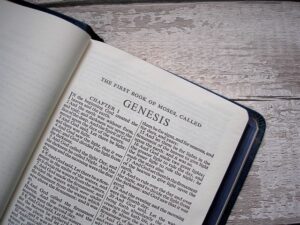This week there is no YouTube class presentation, but we are encouraging participants to view the documentary from Timothy Mahony’s Patterns of Evidence series called “The Moses Controversy” that investigates the question of Moses’ authorship of the Torah. There are two, one hour parts, and we watched Part 1 in class last week. You can download, stream or buy the DVD for viewing by going to their website, patternsofevidence.com/moses. Watch both parts, or Part 2 if you’ve already seen Part 1.
Timothy Mahony’s research uses an investigative approach to the question of Moses’ authorship. His research and interviews include scholars of atheist, agnostic and skeptical views along with those who hold to a historical Biblical view. He addresses the secular view held in academia today and shows us why many have come to that conclusion based on faulty methods of dating events and scholarship bias.
Please note: The paradigm (model or framework which scholars work from) used in secular academia today is one that does not allow for the traditional historical Judeo-Christian view, even though there is ample evidence available as we will see in this documentary. Mahony investigates and presents the most recent research and evidence that supports the historical Biblical claim of Moses’ authorship. Follow along using the four questions below to see if you agree with Mahony’s final conclusion.
Patterns of Evidence Investigative Criteria states that “If Moses wrote the Torah, as the Bible claims, then there should be evidence for the following questions:”
- Was there a form of writing by the time of the Exodus?
- Was there a form of writing available in the region of Egypt?
- Was there a form of an alphabet available by the time of the Exodus?
- Was there a form of writing similar to Hebrew?
Before starting the video, be sure to do the following each week in order to grow in your knowledge of the Bible, along with inviting the Holy Spirit to be your teacher and guide through prayer:
Prayer and Reflection
Write out your prayer cards and exchange them at the end of the study.
Bible Knowledge Practice:
1. What are the five categories of the Old Testament books in the Christian Bible and what are the 39 books of the Old Testament in each of those five categories? (Hint 5-12-5-5-12)
2. What are the “Major Historical Events” – the “Major Players” involved in those events – and the “Major Covenants” found in Genesis and Exodus?
3. What is the “Big Picture” of the Bible (12 points to remember)?
Read, or recite, the memory verse out loud with your group:
“All Scripture is inspired by God and profitable for teaching, for reproof, for correction, for training in righteousness; so that the man of God may be adequate, equipped for every good work.” 2 Timothy 3:16-17 (NASB)
Bible Study
Each week, starting we will have Bible study following the presentation. There will be questions presented here on the weekend, and basic answers will be part of the next presentation. This can also be used to make a leader’s guide for your own small group and future studies!
NOTE: Answers for chapters 43 to 46 from last week will be in the next class presentation, and the ones below will follow the week after…
Always remember to pray before you study and ask the Holy Spirit to teach you and lead you into the truth found in God’s Word – pray for protection from the evil one who will try to discourage, distract and deceive us when we commit to growing closer to the LORD.
Note: Questions are taken directly from the chapters, and answers should be found and cited from the Scripture text in order to be Biblically accurate (unless asked to summarize in your own words). Study Bibles, commentaries and your own thoughts can be used for Discussion or Going Deeper questions. If you use these kinds of sources share them with your group.
1. Review of Class Topic: Before getting into the Bible study questions, discuss today’s class presentation by summarizing what you learned, commenting or asking any questions.
Read Genesis Chapter 47 through Chapter 50, then answer the following questions:
2. (Genesis 47:1-31) In this chapter the family of Israel begin to settle in the land of Goshen (leaving the Promised Land in Canaan), and Jacob with some of his sons meet with the Pharaoh and Joseph. What was the conversation and what special thing did Jacob do to the Pharaoh? What was the agreement Joseph made with the people of the land when the famine became more severe, and how do you think that might affect them down the road, especially later during the time of Moses? How long did Jacob live in the land of Egypt, how old was he when he died, and what did he make Joseph promise to do for him after he died?
Going Deeper: How do we see God’s sovereignty play out with the separation of the people of Israel in the land of Goshen from the Egyptians and the rest of the country, and why that is ultimately important?
Going even deeper (for those of you who like a challenge): Investigate the name Rameses and discuss why this name is the main reason for the controversy over the period of time these events, along with the Exodus, occurs?
3. (Genesis 47:28 – 48:22) Jacob, nearing his last days, gives the promise of the birthright (but not the blessing of the “Seed Promise”) to Joseph through his two sons by giving him a double-portion. What did Jacob tell Joseph about God appearing to him, and what part of the Abrahamic Covenant did he reinforce? Summarize what happened during this blessing of Manasseh and Ephraim and how Jacob compared them to Reuben and Simeon.
Going Deeper: Why did Jacob put Ephraim over Manasseh, and how do we see this played out in the future?
4. (Genesis 49:1-28) In this chapter Jacob gives a blessing and prophecy to each one of his twelve sons before he dies. This, in effect, does away with the “patriarchal” rule and institutes individuality for each tribe as they move forward, even though it is clear that future and final rulership of the Nation (in the form of kings) will specifically come through one tribe, Judah. What did Jacob say to Reuben, Simeon and Levi that gives clues as to his reason for blessing Judah? What does Jacob say to Judah, and what prophetic statements are specifically related to Jesus?
Going Deeper: Make a list of each of the twelve sons and summarize what Jacob prophesied about them (use Joseph’s two sons instead of Joseph).
Going even deeper (for those of you who like a challenge): Can you find, historically, what happened to each of these tribes in fulfillment of the prophecies, and any other Biblical characters that come from these tribes?
5. (Genesis 49:29 – 50:26) This is the final section of Genesis, and the end of Jacob and Joseph’s stories. Where does Jacob tell his sons he wants to be buried, why and who else was buried there? What seems to be unique about the burial process that happened for Jacob? After their father’s death, the brothers’ were afraid that Joseph would now enact revenge upon them, but how does Joseph respond? How old was Joseph when he died, what did he say prophetically to his brothers and what did he make them swear to do? (This comes true in Exodus!!!)
Discuss: How has Joseph’s story inspired you? The key verse for his entire story is found in Genesis 50:20 – copy and use as a memory verse along with the cross-referenced verse of Romans 8:28!
Join us next week as we continue our “Case for the Old Testament, Joseph to Moses!”
———————————————————————
You will not find this material in the public school curriculum even though it is based on solid evidence and grounded in research. It is ironic that following the evidence to where it leads stops at the door of our public schools as they will not let a “Divine footprint” in! Join us as we examine evidence for Christianity and learn how to become a thoughtful defender and ambassador of your faith.
Click into the resource page of this website to view many of the top Christian thinkers and apologists along with some of their work; connecting to these types of resources is essential in your Christian growth.
Please let me know what you think: Give feedback, ask questions or send concerns in the comment section of the blog.
Teri Dugan
TeriDugan@truthfaithandreason.com
1 Peter 3:15




Sorry, comments are closed for this post.